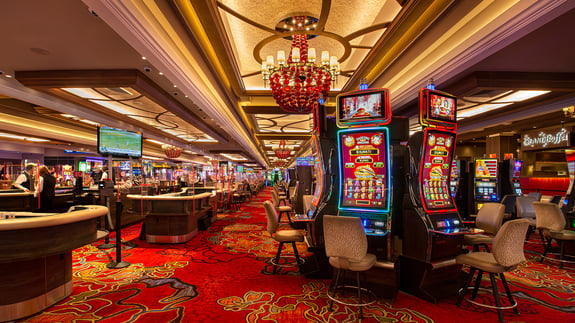Casino games have long captured the fascination of people around the world, becoming an essential part of both leisure and society. From the shimmering lights of the Vegas Strip to the engaging experience of online gaming, these activities evoke excitement, uncertainty, and sometimes even a sense of sentimentality. rockstar66a.com They are not just simply pastimes; they have woven themselves into the texture of our lives, influencing everything from cinema and songs to clothing and writing.
The appeal of casino games goes beyond the wagering aspect, tapping into larger themes of fortune, possibility, and human behavior. As players convene around a poker table or spin the wheel of fortune, they engage in an age-old ritual that resonates with our shared desire for excitement and instability. This obsession has led to the rise of countless references in films, tracks, and gaming, showcasing how deeply entrenched these pastimes are in pop culture. Whether it is the intense drama of a legendary robbery film or the vibrant nightlife portrayed in videos, casino games have carved out a substantial role that reflects our bond with risk.
Historical Importance of Gambling Games
Gambling activities have played a crucial role in social aspects throughout the ages. Stemming from old societies, forms of chance were often connected to ceremonies or events. For example, early forms of gambling can be traced back to ancient China and the Roman Empire, where die games and betting on results were popular pastimes. These activities not only functioned as leisure but also as methods of social interaction, facilitating relationships among people within societies.

As cultures evolved, so did the sophistication and organization of casino games. The establishment of official casinos in the 17th century, particularly in the Italian region, marked a notable shift in how games were viewed and structured. With designated spaces for gambling, the casino became a social hub where people from different backgrounds gathered. This evolution contributed to the validation of gambling, transforming it from a mere pastime into an organized industry that shaped economy and policy.
The impact of gambling activities on mainstream culture cannot be understated. As they were popularized in books and movies, games such as Texas Hold’em and 21 became icons of chance, chance, and strategy. Famous figures and narratives have emerged around these games, reflecting societal views towards fortune, prosperity, and immorality. This fascination with gambling activities has permeated various forms of entertainment, cementing their place in the collective consciousness and linking them to broader cultural narratives throughout the ages.
Portrayal of Gambling Activities in Media
Casino activities have long been a popular subject in various forms of media, reflecting both the fascination and intricacies of the world of gambling. Movies such as Ocean’s Eleven and Casino Royal portray figures who navigate dangerous scenarios, showcasing not only the attractiveness of the casino atmosphere but also the strategies and choices that come with playing popular games like Texas Hold’em and 21. These films often dramatize the exhilaration of winning and the potential repercussions of losing, encapsulating the perils involved in betting.
TV programs have also explored the world of casino games, often integrating them into the plot as a context for story progression and tension. Shows like Las Vegas depict the stories of gambling employees and casino-goers, highlighting the dynamic, often disorderly energy of the casino floor. Docuseries featuring high-stakes betting contests further emphasize the fascination of casino games, drawing viewers into the drama and tactics involved in each round. Through these portrayals, media not only amuses but also stimulates conversations about fortune, expertise, and the nature of chance.
Gaming have increasingly included casino games into their design, allowing players to recreate the feeling of gambling without financial risk. Games within the landscape of online gaming often include online slot machines, poker, and other popular casino games, creating an interactive experience that mirrors real-life gameplay. These virtual portrayals make casino games accessible to a worldwide viewer base, appealing to both gamblers and those who enjoy the thrill of simulation. As a consequence, the representation of casino games in media continues to shape public perception and importance, highlighting their role in society and culture.
Effect of Casino Games on Society
Gambling activities have a meaningful impact on communities, affecting multiple facets of culture and social behavior. They often function as a platform for community engagement, where people gather to experience a shared experience. Casino trips with friends or trips to casinos become social activities that foster connections and create memories. This communal aspect enhances the fun value of casino games, making them a favored choice for celebrations and recreational pursuits.
Moreover, gambling activities have been depicted in numerous movies, television shows, and literature, shaping perceptions and opinions towards gaming and betting. Icons like James Bond playing baccarat or the intense poker scenes in films have cemented these games in the collective imagination. This representation often glamorizes the lifestyle associated with gambling, attracting new players and influencing trends in both style and behavior. These portrayals can ignite curiosity and lead to a more profound investigation of the intricacies of gaming.
Nonetheless, there are also adverse implications linked to the widespread appeal of casino games. The allure of quick monetary gain can lead to gambling addiction and economic troubles for some individuals. Society must contend with these issues, advocating for responsible gaming and education of the dangers involved. Finding a balance between the fun aspect of gambling activities with the potential for harm is vital to ensure that they remain a positive aspect of our societal fabric.